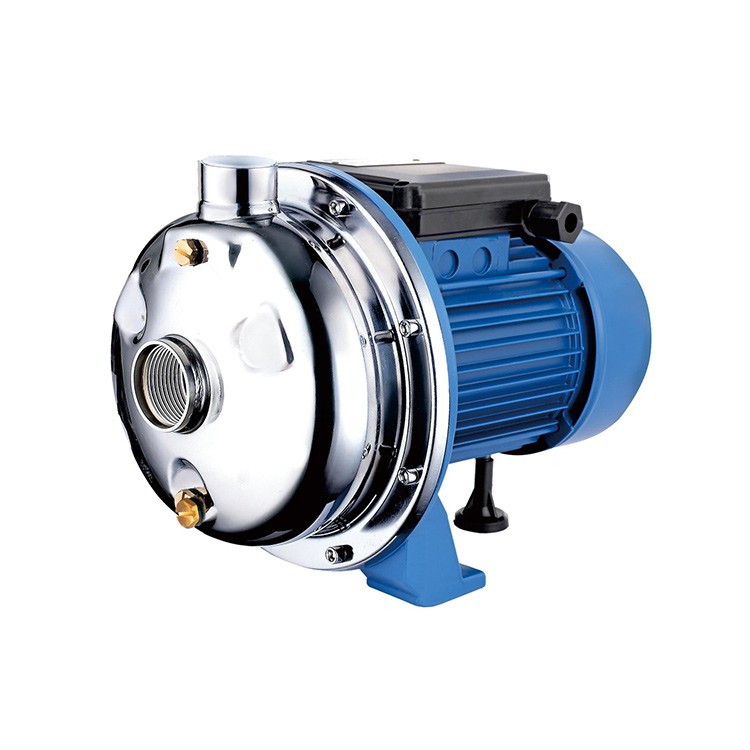Hey there! I'm a supplier of Centrifugal Pump Mini, and today I wanna chat about whether these little pumps can be used for wastewater treatment. It's a question I get asked a lot, and I'm stoked to share my thoughts on it.


First off, let's understand what a Centrifugal Pump Mini is. You can check out more details about it Centrifugal Pump Mini. These pumps work on the principle of centrifugal force. When the impeller inside the pump rotates, it creates a centrifugal force that pushes the fluid outwards. This force allows the pump to move water or other fluids from one place to another.
Now, onto wastewater treatment. Wastewater treatment is a complex process that involves removing contaminants from water so that it can be safely released back into the environment or reused. There are different stages in wastewater treatment, like primary treatment, where large solids are removed; secondary treatment, which focuses on breaking down organic matter; and tertiary treatment, for further purification.
So, can a Centrifugal Pump Mini handle all this? Well, it depends. In some cases, these mini pumps can be really useful. For small - scale wastewater treatment systems, like those in a home or a small business, a Centrifugal Pump Mini can do the job.
Let's say you have a small septic tank system at home. The primary function of the pump here is to move the wastewater from the tank to the drain field or to a treatment unit. A Centrifugal Pump Mini can efficiently transfer the wastewater at a relatively low flow rate. You can learn more about centrifugal pumps suitable for home use Centrifugal Pump for Home.
One of the advantages of using a Centrifugal Pump Mini in wastewater treatment is its compact size. It doesn't take up much space, which is great for installations where space is limited. Also, these pumps are generally easy to install and maintain. You don't need a huge team of technicians to get them up and running.
Another plus is the cost. Centrifugal Pump Minis are usually more affordable compared to larger pumps. For someone on a tight budget, especially in a small - scale operation, this can be a major selling point. You can save money on the initial purchase and also on the long - term maintenance costs.
However, there are also some limitations. Wastewater can contain all sorts of solids and debris. If the solids are too large or too abrasive, they can cause damage to the impeller of the Centrifugal Pump Mini. Over time, this can lead to reduced performance and even pump failure.
In large - scale industrial wastewater treatment plants, the volume of wastewater is much higher, and the contaminants are often more complex. In such cases, a Centrifugal Pump Mini might not be sufficient. These plants usually require high - capacity pumps that can handle large volumes of water and tough contaminants.
If you're dealing with wastewater that has a high concentration of solids, you might need to pre - treat the water before it reaches the pump. This could involve using a screen or a settling tank to remove the larger particles. That way, you can protect the pump and ensure its longevity.
Centrifugal force plays a crucial role in how these pumps work. You can find more about centrifugal force in water pumps Centrifugal Force Water Pump. The faster the impeller rotates, the greater the centrifugal force, and the more effectively the pump can move the fluid. But in wastewater treatment, you also need to consider the viscosity and density of the wastewater. If the wastewater is very thick or has a high density, the pump might struggle to operate efficiently.
In some secondary treatment processes, like activated sludge systems, the Centrifugal Pump Mini can be used to circulate the mixed liquor. This helps in the biological breakdown of the organic matter. But again, the pump needs to be carefully selected based on the specific requirements of the system.
When it comes to tertiary treatment, where the goal is to achieve very high - quality water, the Centrifugal Pump Mini might need to work in conjunction with other more advanced treatment technologies. It can be used to transfer the water between different treatment units, but it might not be able to perform the actual purification steps on its own.
In conclusion, a Centrifugal Pump Mini can definitely be used for wastewater treatment, especially in small - scale applications. Its compact size, affordability, and ease of use make it a great option for home and small business wastewater systems. But in large - scale industrial settings, its limitations become more apparent.
If you're thinking about using a Centrifugal Pump Mini for your wastewater treatment needs, it's important to do a thorough assessment of your system. Consider the volume of wastewater, the type of contaminants, and your budget. And if you have any questions or need more information, feel free to reach out. I'm here to help you make the right choice for your wastewater treatment setup. Whether you're a homeowner looking for a simple solution or a small business owner on a budget, we can work together to find the best Centrifugal Pump Mini for your situation. Let's start a conversation about your specific requirements and see how we can make your wastewater treatment process more efficient and cost - effective.
References:
- Water and Wastewater Engineering: Design Principles and Practice by Metcalf & Eddy
- Pump Handbook by Igor Karassik
